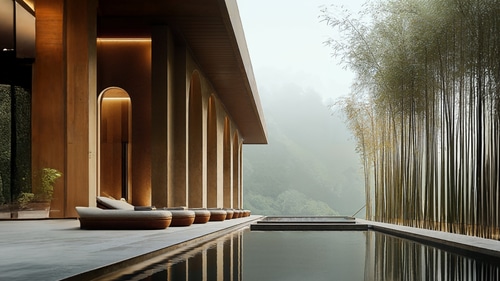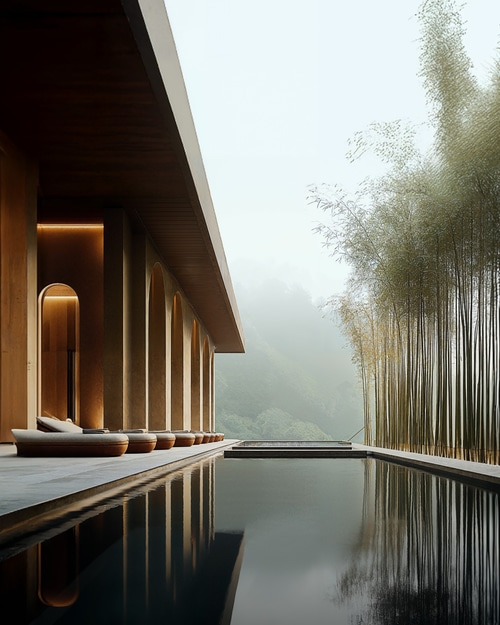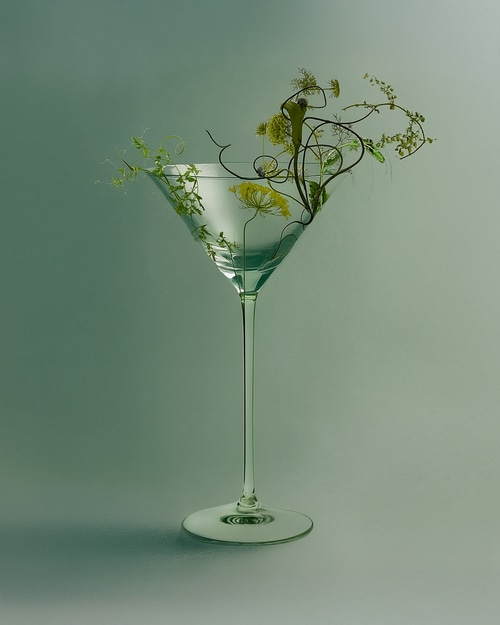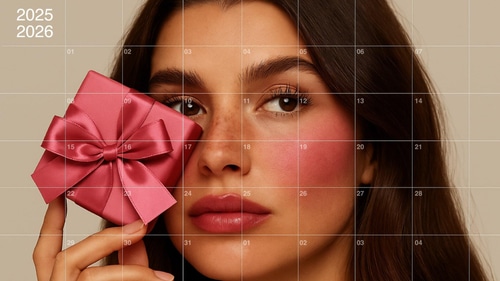

Conscious Hedonism is the Future of Hospitality
In luxury hospitality today, two seemingly opposite desires are rising in parallel. On one hand, serenity and slowness — wellness retreats, longevity tourism, places where time itself feels suspended. On the other, a hunger for something more visceral: pleasure that’s physical, social, even a little outrageous.
These aren’t contradictions. They’re cultural symptoms. In a moment of deep global uncertainty — economic, climatic, existential — we’re seeing the high-end traveler oscillate between retreat and release. From glacier sound baths to jungle ziplines to $600K TikTok-worthy buyouts, today’s luxury guest wants both stillness and stimulation.
At Al Dente, we call this tension conscious hedonism — and it’s reshaping luxury hospitality.
To see this tension in action, we can look to Aman. The luxury hotel brand is very much on the conscious end of things, with an emphasis on wellness that draws on ancient healing practices, and properties designed and built in harmony with their natural surroundings.
Last year, they launched Janu. Janu is positioned as Aman’s younger, more dynamic sibling, still with an emphasis on wellness, but also promising to ‘spark joy’ and ‘stir the soul’. Laying out his vision for the new brand, CEO Vlad Doronin describes a mission to ‘[reignite] the essence of genuine interactions and [foster] meaningful connections once again’. With further outposts in Turks and Caicos and Dubai on the horizon, as well as eight further locations listed as future destinations, Janu is a major launch from one of luxury hospitality’s most iconic brands. And while we’d be hard pushed to call Janu hedonistic, their emphasis on soul, substance and exciting, inspiring experiences does signal a shift towards higher energy and the more tapped in, actively engaged realm of pleasure.
So - if you’re a luxury hospitality brand looking to get ahead of this shift and drive distinctiveness in a landscape of longevity tourism and wellness retreats, what potential directions might you take your brand in? And as ideas of wellness and slowing down continue to exert influence over luxury as a whole, what might brands in other luxury categories learn from all this as well?
We explored the luxury hospitality space to find out, focusing primarily on luxury hotels, how they’re positioned and what they promise to guests. As a result, three key cultural themes emerge, each a different idea that brands might tap into to drive distinctiveness against a landscape of conscious, quiet luxury:
RAW ADVENTURE
When it comes to luxury natural stays, Japan is traditionally associated with secluded onsen (hot springs). These places tend to position themselves as an escape from the city, offering respite from your daily life and an opportunity to reconnect with nature. Greenity Iwata is a great example, described as ‘a place that connects with the sky, nature and people’, and promising to ‘breathe fresh air into your heart’. Connection with nature runs through every touchpoint from its minimalist design that blends seamlessly with surrounding tea fields, to the restaurant emphasising local, seasonal cuisine.
Okinawa’s Junglia, then, opening this July, represents something quite different. The resort makes a theme park of the island’s Yambaru Forest, with buggy adventures through the jungle and tree-top trekking and hot air balloon rides that skirt the canopy. With the tagline ‘Power Vacance!!’ (not one, but two exclamation marks!!), Junglia promises ‘a journey of excitement and luxury’. Meanwhile, halfway across the world in Scotland, the Gleneagles Estate is ‘a Glorious Playground’, with country pursuits like fishing, shooting and riding available to try across their extensive grounds. The Gleneagles’ intrepid spirit is best encapsulated by their annual race event, The Great Adventure. The classic course is a slim 55km: a canoe across the loch, a run over Perthshire, and a cycle through nearby country roads will land you back at the estate for a celebratory dinner.
Luxury brands looking to depart from conscious ideas of respite and healing might take cues from Junglia and Gleneagles Estate – to invoke a wilder, more dynamic and unpredictable vision of nature. Within this vision, we see a new way for audiences to relate to and experience the natural world, one that’s more actively engaged, stimulating and adventurous. In the uncertainty and pessimism of our times, Raw Adventure can offer renewed energy and invigoration. This is natural territory for high-end outdoor brands like Arc’teryx and Moncler, but even in the wider world of luxury fashion, we see Prada tapping into a more rugged vision of nature in their 2025 Re-Nylon campaign. The campaign showcases the durability of ECONYL (Prada’s regenerated nylon material) by depicting Re-Nylon and ambassadors Benedict Cumberbatch and Sadie Sink in wild outdoor settings, all while drawing a connection to the brand’s efforts around ocean conservation.
SPONTANEOUS CONNECTION
Privacy has always been of extreme value to the HNW traveller. Newly opened in March, Raffles’ outpost on the island of Sentosa, Singapore was built with privacy at its heart. Described as a ‘haven of wellbeing’, the resort consists only of villas, secluding you not only from the outside world but from your fellow travellers too. Your own private pool and terrace and in-villa dining, massages and therapies mean you may never cross paths with them either.
By contrast, Remedy Place in New York, LA and Boston is ‘designed exclusively for everyone’. The ‘social wellness club’ sees enriching your social life as part of enhancing your wellbeing, and suggests making Remedy Place your date spot or after work hangout – though a members’ club, guests are welcome and connection is key. Ace Hotel shows us another way that luxury hospitality can connect us, with properties that interface with the places and communities that surround them, bringing the outside in, and with a programme of events (like books swaps and DJ nights) that turn their hotels into social spaces for tourists and locals alike.
What’s clear is that for luxury brands, exclusivity and openness to connection don’t have to be mutually exclusive. Far from needing necessarily to enclose HNW audiences in their own private world, there’s room for brands that open people up to the unexpected, to the possibility of connection with community and each other. The new luxury is shared, not sealed off. Beyond hospitality, we see Chanel speaking to looser, more open ideas of connection by chance in their campaign for Coco Crush ‘Some encounters you wear forever’ in January 2024. In the chaos of today’s world, Spontaneous Connection can offer light: a reminder and the belief that there’s joy to be found outside and with others.
NONCHALANT FUN
As the quest for deep and meaningful experience has grown in luxury as a whole, so too have desires for conscious engagement with local culture and intellectual stimulation and learning in luxury travel. Hotels are serving this need – for example, art’otel London Battersea runs an artist residency, inviting local artists into their studio to create and then showcase their work. The Mandarin Oriental has made moves in this direction too, partnering with luxury tour brand The Luminaire to offer exclusive learning-driven experiences that include a deep-dive into Swiss watchmaking in Geneva and a historical tour of Da Vinci’s Milan.
At the same time, we’re also seeing the emergence of luxury hospitality that does indeed connect travellers with culture, but which forsakes the conscious for a hedonistic edge. Take Mama Shelter, for example - at the brand’s Dijon hotel, you’ll find design nods to the winemaking heritage of the region, with boundaries between high and low culture blurred by karaoke rooms, a cinema room and foozball in the main conference room. The brand’s principles of ‘exciting design’, ‘good food’ and ‘nurturing hospitality’ are hallmarks of luxury - it’s the ‘sprinkling of cheekiness’ that brings a fun and playfulness that’s at odds with what’s dominant in luxury hospitality today. The Grand Velas Boutique Los Cabos’ Billionaire Buyout is another example, offering luxury travellers the chance to “buyout” the entire resort for three nights at $600,000. This concept all started when a couple’s TikTok went viral, showing their shock at how empty the place was soon after opening. By turning this viral moment into a real experience, Grand Velas has been able to recognise, tap into and speak to internet culture.
Light-hearted, humorous and with a devil-may-care attitude, Nonchalant Fun is the most hedonistic of our three cultural themes. Though examples like Mama Shelter Dijon and Billionaire Buyout might even be tacky to some luxury travellers, to others they offer playfulness, fun and a unique experience - all of which take on more importance in troubled times. And just like the other two themes identified here, there are signals of this one showing up in the broader world of luxury too. Jacquemus hosted a banana-themed launch of its LA store last month, with founder Simon Porte Jacquemus arriving in bright banana yellow, stacks and bouquets of bananas on display, banana soft serve on tap, and a banana-shaped car outside. The banana motif has indeed appeared on the Jacquemus runway – but the level of commitment to the fruit at this party can only be read as comical and irreverent, frustrating any search for deeper meaning, but fun, playful and uplifting nevertheless.
Overall, across our three cultural themes, we see a return to a lot of what travel is ‘meant’ to be about: fun and spontaneity, exploration and discovery, connection and community. Culturally, it feels like luxury (and luxury hospitality especially) has retreated from all this as part of a conservative response to what’s going on in the world. But just as luxury hospitality is tapping back into these ideas, Prada is emphasising the rugged durability of Re-Nylon in the outdoors, Chanel is depicting chance encounters with Coco Crush, and Jacquemus is hosting a banana launch party that takes its theme to absurd extremes. The values shaping luxury travel anew are seeping into luxury at large. When surrounded by chaos and uncertainty, more hedonism might be just what we need.
This Insight was cooked up by Al Dente contributor Zoe Liu.


